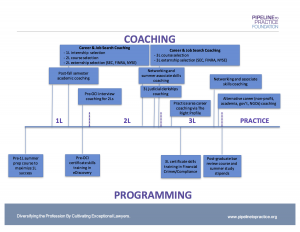Why We Serve
Given that many young, low-income students have never been exposed to lawyers and might not consider a career in the legal profession, society as a whole suffers when these talented individuals choose to pursue other opportunities. In response to this need, a number of pipeline programs have evolved at the high school and undergraduate level to increase awareness of, and build interest in, careers in the legal profession.
Once admitted to law school, despite drive or innate talent, students from underprivileged backgrounds without any lawyers to advise them often find themselves frustrated by a lack of familiarity with law schools’ illusive pedagogical approach and common strategies for success. Pipeline to Practice is committed to equipping these students with skills and knowledge to help them define and achieve their legal ambitions. Because academic success in law school directly correlates to post-graduate employability, low-income students must fully prepare for the challenges they will face in law school; otherwise, the unintended consequence of early pipeline programs is a system that unwittingly saddles people with staggering law school debt and little hope of finding meaningful employment. Strong academic performance in law school is so crucial to having real career options, the legal profession has a moral obligation to ensure that the lives of students it attracts are improved by their decision to become lawyers, not worsened.
Promoting justice and a more inclusive legal profession hinges on the success of students in the pipeline. The next generation needs not only leaders who will continue to push for greater representation of all views, but also role models at various stages in their careers to call on for advice, mentorship professionals, and demonstrating that a successful career in law is an achievable goal regardless of your background.
To truly move the needle for low-income students in the legal profession, we need a long-term commitment to student success that provides tools for academic excellence, opportunities for meaningful employment, and a network of committed role models and mentors.







